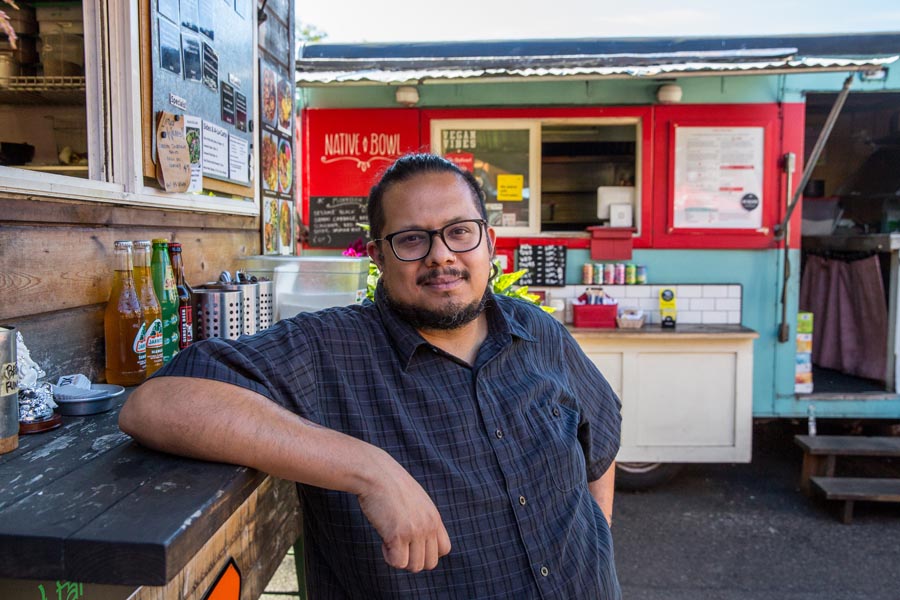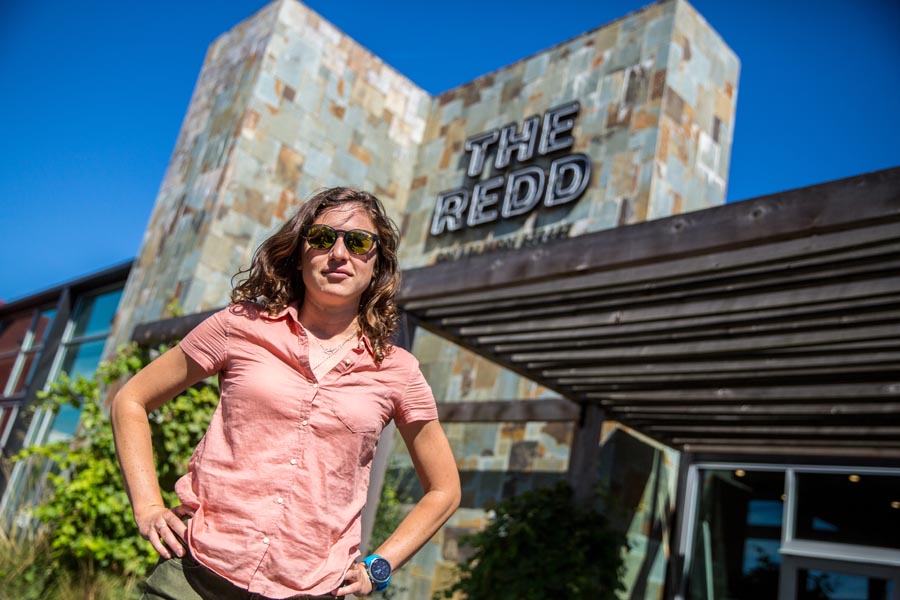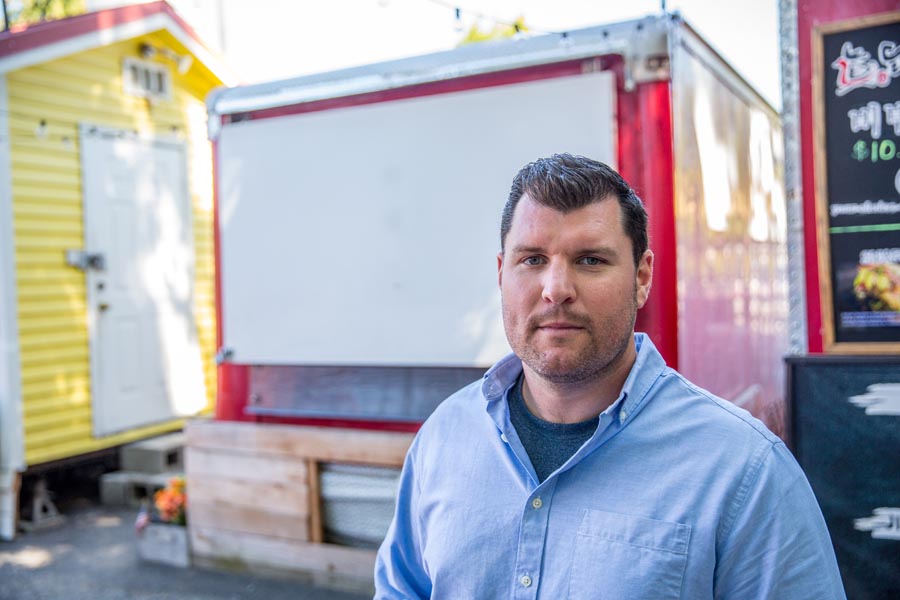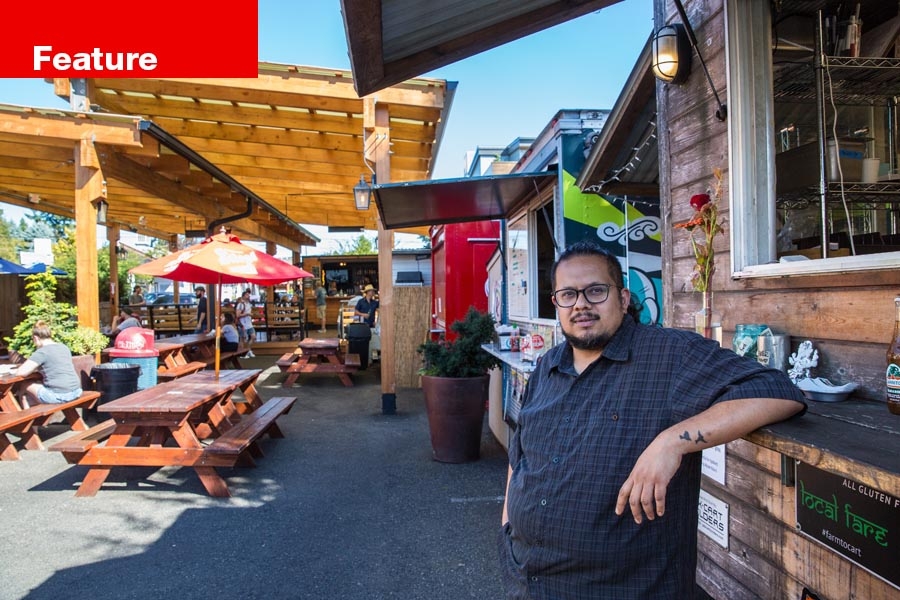Portland’s development boom is displacing the city’s much-loved food carts. What does their future look like?
The iconic Portland food carts have delighted and satisfied the bellies of customers for decades, and over time the scene has become a monumental part of the city’s individuality.
Whether it’s authentic Thai cuisine, German, Mexican or just a classic American burger to fit the craving for a hot meal, there has always been more than enough to choose from when heading to one of the city’s several food-cart pods.
Yet even though these mobile restaurants are a beloved part of the culture, Portland is changing and food-cart owners are having to adapt.
At the end of June, purveyors of food trucks were told to vacate the popular Alder Street food-cart pod on Southwest 10th Avenue and Alder Street in downtown Portland.
The pod was the largest in the state. This was a visible loss due to its prime location and solid reputation for its diverse menus and quality food for the past two decades.
The reason for closing: A new Ritz-Carlton hotel will be built in its place and will open in the next several years.
The City of Portland Bureau of Planning recently published a study that was conducted with the Urban Vitality Group to study the effects of food carts on neighborhood livability and street vitality.
Based on survey results, inventories and interviews with business owners in four food-cart pods around the city, the group found that food carts have a positive impact on both neighborhood life and street vitality as they provide affordable dining options, social interaction and convenience.
Despite the benefits, the fact that food-cart pods are being displaced by larger developers is very real, though it is not anything new.
Eden Dabbs, spokesperson for the City of Portland Bureau of Planning and Sustainability, shares that landowners welcomed food carts as a temporary use of the land while they underwent design and development review phases.
“The only jurisdiction the City of Portland has over this private property and/or project is type of use…development review, building inspections, etc. Design Commission also weighed in during the architectural design phase. Other than that, the City cannot tell a property owner what to do with their land,” wrote Dabbs in an email.
The city has collaborated with others to find a new home for the displaced food carts, and one emergent idea is a food cart “culinary corridor” located near the North Park Blocks in downtown Portland.
RELATED STORY: Where have all the food carts gone?
Matthew Gebhardt, assistant professor of urban studies and planning at Portland State University, explains that Portland’s approach to regulating food carts is uncommon in that most cities treat food trucks as mobile.
These cities govern where and how long the truck can operate in the public right-of-way and usually prohibit them from operating on private property. Portland is just the opposite: Most operate on private property with relatively few restrictions.
“Unfortunately, the approach is now contributing to the change that is happening, at least in terms of the displacement and changing geography of existing food-cart pods,” says Gebhardt.
“Development pressure means vacant properties and surface parking lots, particularly in central neighborhoods, are being redeveloped. If Portland’s food carts operated like food carts in most other cities, the effect of redeveloping private properties on food carts would not be so visible or dramatic.”
While the closure of the Alder Street pod is significant, it is not necessarily indicative of the death of food carts, says Leah Tucker, founder and executive director of the Oregon Mobile Food Association. “In just the last year, there has been quite a bit of change in the industry,” she says.
“We’ve seen cities and the state as a whole change codes and regulations to both help and hinder the mobile-food operations in their communities. By its very nature, the mobile-food industry is extremely transitional. We see mobile units come and go, pods open and close. The food-service industry has always seen this process, even in brick-and-mortar restaurants.”
 Deepak Saxena, owner of DesiPDX food truck. Photo: Jason E. Kaplan
Deepak Saxena, owner of DesiPDX food truck. Photo: Jason E. Kaplan
Food cart owners are sanguine about their future despite the changing landscape. Deepak Saxena, owner of DesiPDX, a popular Indian fusion food cart on North Mississippi Avenue in North Portland, says the scene is shifting a bit, but not necessarily in a bad way.
“I personally don’t think the idea of a food-cart pod is over; I think it is just evolving. The days of an empty parking lot with just a bunch of food carts is coming to an end, as it makes a lot more sense for a developer to just turn that into something more financially valuable,” he says.
Saxena says the future is the model of food carts combined with an anchor tenant — most likely a bar or brewery. He adds this model is better for food-cart owners as they are more curated to provide a multitude of unique options that don’t compete directly with each other.
Examples of food-cart pods based around an anchor tenant include Prost! Marketplace on North Mississippi Avenue, where Saxena’s food truck is located, and The Lot at Scout Beer on Southeast Division and 50th streets.
Ironically, food-cart pods may take on a more corporate vibe to survive. Such an approach could take the form of larger food-cart pods emerging with a brand and logo. These pods are curated for a mix of cuisines, offer different amenities and operate similar to how brick-and-mortar retail centers are managed.
“If food-cart pods start adopting other key features of retail centers like this — moving the most popular and profitable carts to the most prominent and visible locations, or placing ‘anchor’ carts on opposite ends of the space so that diners walk by the smaller carts to get from one to the other — that will be a sign that pod operators are definitely copying ‘corporate’ approaches,” says Gebhardt.
With the evolving landscape comes education, too. Tucker and her team at the Oregon Mobile Food Association spend a lot of time trying to help communities understand the importance of the mobile restaurant business model.
“The scene is definitely changing, and I think communities are trying to figure out how to adjust to those changes. I love the flexibility of this industry — it is one of the biggest draws for entrepreneurs, even if it is sometimes hard to manage or keep up with. We are really trying to help communities see the rich diversity it can bring, as well as the economic value mobile units bring,” says Tucker.
The possible future of food carts may be seen in the type of “food hub” model emerging in the city, which takes away the mobile nature of food trucks. The nonprofit Ecotrust is reshaping the local food economy through its latest project, the Redd on Salmon Street, a two-block food hub that houses more than 150 businesses operating out of various spaces.
 Emma Sharer, Ecotrust Redd campus manager, at the Redd on Salmon Street Photo: Jason E. Kaplan
Emma Sharer, Ecotrust Redd campus manager, at the Redd on Salmon Street Photo: Jason E. Kaplan
Emma Sharer, Ecotrust Redd campus manager, explains that its recent launch of Powerhouse Café is one way that they are helping support small to midsize food businesses to scale up. The space is a freestanding kitchen and service counter in the courtyard of event space Redd East.
“At 150 square feet, the building is not much larger than a food cart, but it offers plumbing, electricity and other features that help its operator focus on cooking and selling food. It is a natural next step for a food-cart owner,” says Sharer.
The venture prioritizes minority-owned businesses as tenants of the cafe. It is an example of the change the organization wants to see: support for food-cart owners that will enable them to scale up into a restaurant model with minimal barriers to entry. “We hope that more models pop up like this one to continue this growth trajectory,” she says.
 Brandon Appel, co-owner of The Portland Press. Photo: Jason E. Kaplan
Brandon Appel, co-owner of The Portland Press. Photo: Jason E. Kaplan
Brandon Appel, co-owner of The Portland Press, a gluten-free pressed waffle sandwich food cart, says the future of food carts will be strong if the community continues to show support. “Food carts and trucks are a part of the fabric of Portland. Portland essentially wrote the book on the American food-cart/food-truck scene. It is a part of our culture and tourism industry.”
Despite his enthusiasm for the city’s food-cart scene, Appel sold his waffle sandwich cart in September to move into the Fork Forty Food Hall in Salem. The new food hall, Salem’s first, will be similar to Pine Street Market in Portland, a collection of gourmet vendors under one roof. Appel likes the food hall model because it will allow him to serve customers year-round.
“As people embrace the food-cart scene, developers will open up more of a hybrid of brick and mortar and mobile,” says Appel.
In the long term, he plans to return to the Portland market either with a bigger food truck or to move into a food hall. But for now he thinks he can have a bigger splash in Salem. “The food market is saturated in Portland. You need a lot of money and advertising,” he says.
Despite the upheaval, food carts remain popular with patrons. The dismantling of the Alder Street pod is a particular loss to nearby office workers who are now forced to look elsewhere for lunch. After the closure of the pod, eateries within a half mile have been flooded with increased demand from lunch-goers.
Caitlin Lilly, Portland resident and frequent food-cart patron at various pods in the city, says she recognizes that many food carts simply won’t survive the urban upheaval and the shift in trends. But like Appel, she encourages people to do what they can to support these small business owners.
“I think the food carts are awesome for a few reasons: They give local chefs an opportunity to showcase regional specialties that might not be viable in a traditional restaurant setting, and they are such an innovative use of empty spaces like parking lots and open land. There are still so many culinary gems sprinkled throughout the city, and it’s important to help preserve them.”
Portland will continue to be home to a myriad of food carts that are breeding grounds of creativity and culinary passion. Although the landscape today might look different than it did in years past, food carts remain an integral part of the city’s distinct reputation for food innovation.
Tucker reiterates: “I don’t think the pod scene is over. We are seeing pods pop up all over the state. Across the nation, pods are being created just because of the pod culture we created right here in Portland.”
To subscribe to Oregon Business, click here.






